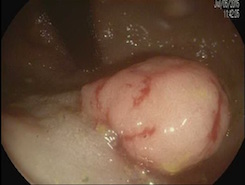Man Referred for Potential Tubulovillous Adenoma
 A man in his early 50s consulted with a gastroenterologist after observing blood in his stool. When colonoscopy revealed a large polypoid mass, a superficial biopsy was performed. Findings on biopsy were suggestive of tubulovillous adenoma. Concerned that the mass could become cancerous, the gastroenterologist referred the patient to Duke Gastroenterology.
A man in his early 50s consulted with a gastroenterologist after observing blood in his stool. When colonoscopy revealed a large polypoid mass, a superficial biopsy was performed. Findings on biopsy were suggestive of tubulovillous adenoma. Concerned that the mass could become cancerous, the gastroenterologist referred the patient to Duke Gastroenterology.
Question: How was the patient’s condition treated?
Answer: After performing endorectal ultrasonography, which showed that the mass, though large—approximately 3 cm—had not grown deeply into the rectal wall, Duke gastroenterologist Rebecca Burbridge, MD, removed the mass in one piece with endoscopic mucosal resection.
Endoscopic resection of this type of mass is challenging, but it can be a great option for appropriate patients, Burbridge says: “Complex polyp removals come with a high risk of bleeding and complications overall, so a lot of centers don’t like to tackle them. But, by removing this polyp endoscopically, we were able to spare this patient from needing a major surgery.”
It was also important that she was able to take out the polyp in one piece, Burbridge says. Removing a mass in multiple pieces creates uncertainty as to whether the entire cancer has been removed.
Pathology following the endoscopic mucosal resection revealed stage T1 N0 rectal cancer with negative margins, confirming that, although the mass had turned out to be an invasive adenocarcinoma, it had been fully removed and the patient would not need surgery.
Now, several years later, the patient continues to follow up with a medical oncologist at Duke, undergoing computed tomography scans and magnetic resonance imaging every 6 to 12 months. He has had no signs of recurrent cancer.
“I think we are pushing the envelope at Duke in terms of what we can do with endoscopic removal for colon masses,” Burbridge notes. “When our surgeons see patients with complex colon polyps or polypoid masses, instead of immediately scheduling surgery, they frequently ask the Duke Advanced Endoscopy group to reassess whether the polyp/mass is something that can be removed endoscopically because they know we can often spare a patient a surgery. I think this says a lot about our abilities to remove complex colon polyps.”
Duke Gastroenterology is also working on new techniques that will allow for potential full-thickness resection of colonic masses/polyps in the future, she adds.